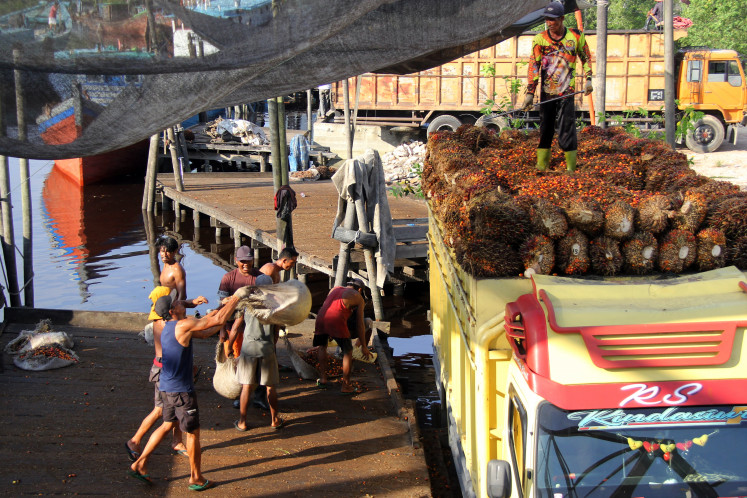Popular Reads
Top Results
Can't find what you're looking for?
View all search resultsPopular Reads
Top Results
Can't find what you're looking for?
View all search resultsKampung Pulo evictees scratch heads as free-rent period ends
When Sukinah and her mother decided to move to the Jatinegara rusunawa (low-cost apartment) in East Jakarta after being evicted from Kampung Pulo last August, they knew that one day the free-rent period would end and that they had to get back on their feet as soon as possible
Change text size
Gift Premium Articles
to Anyone
W
hen Sukinah and her mother decided to move to the Jatinegara rusunawa (low-cost apartment) in East Jakarta after being evicted from Kampung Pulo last August, they knew that one day the free-rent period would end and that they had to get back on their feet as soon as possible.
'However, it is more difficult than we thought. The income from a food stall here is not as lucrative as in Kampung Pulo,' Sukinah told The Jakarta Post recently. 'With this amount of income, I am not sure how long we can stay here.'
Sukinah's family are among 1,040 families who were evicted from Kampung Pulo by the Jakarta administration that declared the settlements on the riverbanks illegal.
However, the majority of riverbank dwellers have semi-formal or informal tenure arrangements such as Eigendom Verponding (proof of property ownership) issued by the Dutch administration before independence or proof of the subsequent purchase of verponding land.
Around half of the evictees moved to Jatinegara apartment, as the administration promised not to charge them rental fees for the first three months. Starting in December, the tenants would be charged a rent of Rp 300,000 (US$21.7) per month, and they were given until Dec. 20 to pay the fee.
Besides the rental fee, the tenants have to pay water and electricity bills that usually amount to between Rp 100,000 and Rp 150,000.
Sukinah, who also ran a food stall in front of her former house in Kampung Pulo, said she used to earn more, as a lot of their neighbors had been loyal customers. Now in Jatinegara apartment, Sukinah competes with other kiosks that sell similar food on the apartment building's second floor, which is designated as a business area.
When the Post visited the area during lunchtime, only a few customers were seen buying food, while most of the sellers were sitting around their stalls.
'My head hurts when I realize that it is December already and we have to pay the rent,' Sukinah said, adding that she also had to pay a fee for the food stall.
Nuraini, 26, echoed Sukinah's sentiment, saying that the monthly fees for rent, electricity and water were too much for her and her husband to handle. She said when they were in Kampung Pulo, they lived in her parents' house, which has been destroyed by the city administration during the eviction in August.
With her husband still looking for a job, Nuraini said they were considering to move to a more affordable place in Jakarta.
'I hope the apartment management can charge us lower fees, otherwise it may be time to move,' she said.
By contrast, Tita, another resident at the low-cost apartment building said her stall that provides snack, beverages and food was doing well in the kiosk area on the second floor. She said she even earned more money than in Kampung Pulo.
'It is way better now, and I am positive we will be able to survive for at least a few months,' she said.
Many have criticized the relocation policy, saying that evicted residents would be deprived of their political, social, economic and cultural rights, resulting in a loss of culture and a decline of economic capability.
Housing and Government Building's Agency head Ika Lestari Aji said the conditions were similar at other apartments throughout the city, with tenants unable to pay the rent, resulting in months of arrears.
Ika said that she would learn about the evictees' problems and try to find the most effective solution. 'There are basic solutions to solve the problem; we need to study every case first,' she said, as quoted by kompas.com.
The administration plans to evict around 12,000 families occupying riverbanks this year, despite a housing backlog that would leave the majority of evicted residents with no place to go.










